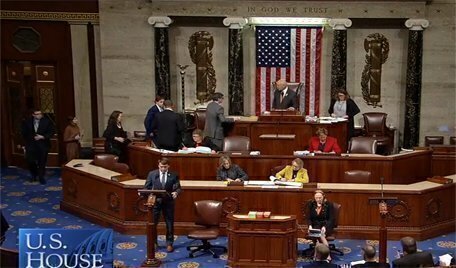As public hearings start in the House’s impeachment proceedings about President Donald Trump, the National Constitution Center presents a comprehensive look at the process and diverse opinions from leading scholars about impeachment.
 The Center has featured experts on impeachment in its Interactive Constitution, and hosted scholars at public events debating the grounds for impeachment and the Founders’ intentions. Scholars Neil J. Kinkopf and Keith E. Whittington explored common perceptions in a series of essays, while diverse experts such as Elizabeth Holtzman, Gene Healy, Martha Jones, John Malcolm, Quinta Jurecic, Joshua Matz, Alan Dershowitz, Ken Starr, and Cass Sunstein have joined National Constitution Center President and CEO Jeffrey Rosen during these debates.
The Center has featured experts on impeachment in its Interactive Constitution, and hosted scholars at public events debating the grounds for impeachment and the Founders’ intentions. Scholars Neil J. Kinkopf and Keith E. Whittington explored common perceptions in a series of essays, while diverse experts such as Elizabeth Holtzman, Gene Healy, Martha Jones, John Malcolm, Quinta Jurecic, Joshua Matz, Alan Dershowitz, Ken Starr, and Cass Sunstein have joined National Constitution Center President and CEO Jeffrey Rosen during these debates.
Following are summaries of the constitutional issues, the Constitution’s sections related to impeachment, and the debates hosted by the Center that explore many sides of this historic issue.
Interactive Constitution: The Grounds for Impeachment
Neil J. Kinkopf and Keith E. Whittington explain how the Impeachment Clause was included in the Constitution to create another check against abuses by government officials and to give Congress the ability to remove from power an unfit officer who might otherwise be doing damage to the public good.
Balancing independence and accountability in impeachable offenses
Keith E. Whittington says the impeachment power exists at the far margins of American constitutionalism. The Founders sought to create three branches of government, each independent of the others and enmeshed in a system of checks and balances. But the desire for independence had to be balanced against a concern with accountability.
The scope of the impeachment power: what are “high crimes and misdemeanors”?
What sort of conduct is so harmful that Congress is justified in impeaching and removing an officer who commits it? Neil J. Kinkopf explains that the Constitution’s answer is “treason, bribery, or other high crimes and misdemeanors.” Treason and bribery are clear enough, but the concluding phrase “other high crimes and misdemeanors” is anything but clear.
In the Constitution
The House's Impeachment Powers
The Senate's Impeachment Trial Role
The Rules for Impeachment Proceedings
We The People Podcasts
What does the Constitution say about impeachment?
October 24, 2019: How should impeachment be carried out, according to the Constitution? This episode explores the constitutional process of impeachment, from investigation and passage of articles of impeachment by the House of Representatives, to the Senate trial, and the aftermath. Rep. Elizabeth Holtzman, who served on the House Judiciary Committee during the Nixon impeachment, and Gene Healy, author of Indispensable Remedy: The Broad Scope of the Constitution’s Impeachment Power detail the constitutional framework under which impeachment has been carried out in the past, how those precedents compare to what’s happening today, and what might happen next. Jeffrey Rosen hosts.
The Battle for the Constitution: Live at The Atlantic Festival
September 26, 2019: the National Constitution Center in partnership with The Atlantic discussed the breaking news of the House’s impeachment inquiry into President Trump, as well as what separation of powers means in U.S. government today. Jeffrey Rosen, President and CEO of the NCC, kicks off the discussion in conversation with Martha Jones, professor of history at John Hopkins University, John Malcolm, Vice President for Constitution Government at the Heritage Foundation, and Quinta Jurecic, managing editor at Lawfare. Later, Representatives Lance Gooden (R-TX) and Adam Schiff (D-CA) speak about their views on the impeachment question and the proper exercise of congressional power.
What constitutes an impeachable offense?
August 30, 2018: To shed light on when and how the Framers intended for the impeachment power to be used, Alan Dershowitz and Joshua Matz join host Jeffrey Rosen for a spirited debate. Dershowitz argues that commitment of a crime is a necessary, but not totally sufficient, condition for impeachment, while Matz counters that every crime is not necessarily an impeachable offense and an impeachable offense does not have to be a crime.
Transcript: https://constitutioncenter.org/podcast-transcript-what-constitutes-an-impeachable-offense
Town Hall Video
Ken Starr: A memoir of the Clinton investigation
November 5, 2019: Former special prosecutor Ken Starr shares his definitive account of one of the most divisive periods in American history in his new book, Contempt: A Memoir of The Clinton Investigation. Starr offers his unique perspective on the investigation that eventually led to the impeachment of President William J. Clinton
The power of impeachment: Its history and future
June 19, 2018: Joshua Matz, author of To End a Presidency: The Power of Impeachment, joins the Center for a deep dive into the history and future of presidential impeachment.
Cass Sunstein and a citizen’s guide to impeachment
November 07, 2017: Despite intense interest in the subject, the constitutional process of impeachment is widely misunderstood. Cass Sunstein, former White House advisor and author of Impeachment: A Citizen’s Guide, identifies the most common misconceptions and illuminates the constitutional design behind the process.
Constitution Daily Blog Posts
Early impeachment trials dealt with familiar issues
October 28, 2019: What type of misbehavior rises to the level of impeachment charges and trials in Congress? The first three impeachment proceedings under the Constitution yielded different results as lawmakers debated questions that remain with us today.
The House’s role in the impeachment inquiry process
September 25, 2019: What is an impeachment inquiry and where does it fall in the range of the House’s constitutional powers?







